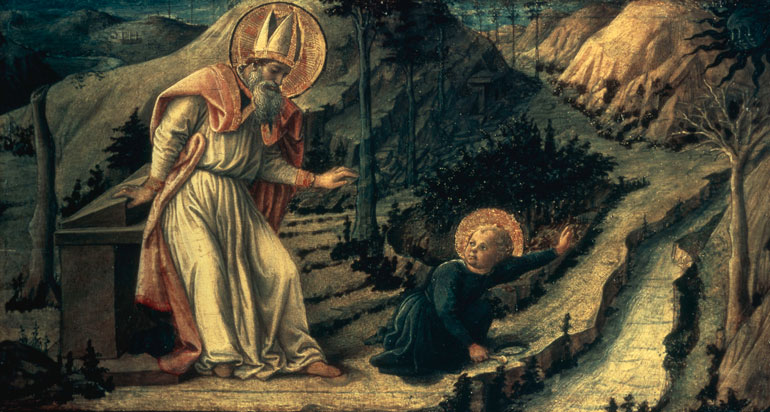
 AUGUSTINE: CONVERSIONS TO CONFESSIONS
AUGUSTINE: CONVERSIONS TO CONFESSIONS
By Robin Lane Fox
Published by Basic Books, $35
Augustine: Conversions to Confessions may be informative to the nth degree, but it's not dense. Robin Lane Fox says he wrote this biography for all readers -- even those in a post-Christian age who do not share Augustine's religious beliefs.
A towering figure in Western philosophy, St. Augustine (354-430), bishop of Hippo, came from Thagaste, a small town in North Africa. After a wanton youth but a sterling education, he converted, became a priest, and later bishop. More than 100 books, 240 letters, and 500 sermons are ascribed to him.
Two of them, City of God and his autobiography Confessions, are still widely read more than 1,500 years later. In 1298, Pope Boniface VIII recognized him as a doctor of the church. Evangelical Protestants consider him a theological luminary in the tradition of the Apostle Paul.
Fox suggests that a brilliant mind and a penchant for mysticism drove Augustine's success. A noted historian and an emeritus fellow at New College, Oxford, Fox is co-translator of The Confessions published by Everyman's Library. He considers himself a classicist (he isn't Catholic) and views Augustine as an intellectual giant rather than as a saint.
Fox's narrative moves chronologically, beginning with Augustine's birth. During each phase of Augustine's life, Fox discusses related historical events, religious trends, and philosophical movements, as well as educational and cultural trends.
Fox also explains concepts such as Platonism, Neo-Platonism, and Manicheanism, a sect that Augustine joined for nine or so years and later fought.
Although the amount of detail may seem overwhelming, Fox describes everything engagingly. He also believes one cannot understand Augustine without knowing this background.
To add perspective, Fox includes descriptions of the lives of two contemporaries -- one a pagan and one a Christian -- showing how they handled issues that affected Augustine.
Augustine says little about Patricius, his father, in his Confessions, but not because they did not get along, as some biographers suggest. Confessions is about Augustine's relation to God, and since Patricius was a pagan until he was baptized on his deathbed, Fox believes his life was irrelevant. (For the record, Fox believes Augustine inherited his outgoing and warm personality from his father.)
But Augustine's discussions about his mother, whom he considers his source of God's grace, were quite relevant. Augustine writes that he "was being flavored with salt from the very [leaving of] the womb of my mother."
Monnica (Fox's spelling is based on the derivation of her name from the name Ammonica) was an uneducated tribeswoman. Born into a Christian family circa 331-332, she married at the age of 16 and had Augustine a few years later.
Monnica deeply loved her son. That love became a burden as she tried to curb his libertine ways during his early adulthood. Augustine left her, but she soon caught up with him. "She loved my being with her as mothers do," Augustine remarks, "but much more so than many do."
Interestingly, Fox compares their relationship with that of Paul Morel and his mother in D.H. Lawrence's Sons and Lovers. Both men were influenced by their mothers, but Augustine (after he abandoned his concubine) took Monnica's directions a step further by choosing celibacy because it was a high Christian value, as opposed to marrying a person in his social class as she had urged.
As a widow, Monnica lived with Augustine in Milan, where she became a follower of its bishop, Ambrose, who later converted her son to Roman Catholicism. Monnica, meanwhile, had visions of God and angels, according to Augustine. One vision showed her that she and her son would work together to further spread the message of Christ.
When Monnica died in 387 in Ostia, her vision seemed verified. St. Ambrose had recently baptized Augustine.
When Augustine was in his 40s, he wrote Confessions. Although it's called an autobiography, Fox considers it a book-length prayer to God, who is the "you" addressed throughout the text.
The book's intimate tone can be ascribed to Augustine's belief that he has visions and hears God speaking to him. Although Fox doesn't believe in Augustine's visions, he is inspired by Augustine's book, saying, "We will never finish with his confessions because they will not finish with us."
Confessions is composed of 13 books, each made up of many chapters -- some only a paragraph long. Divided into two parts, Confessions discusses "What I Once Was" and "What I Am Now."
The first nine sections cover Augustine's early life, his waywardness, his relationship with his concubine and their son, his belief in astrology, his membership in the outlawed Manichean sect, his several conversions, and his mother's death.
The latter parts, which Fox values most, are less autobiographical. They cover Augustine's meditations on subjects like the story of creation and the nature of the soul, and of memory. Fox points out that these have inspired John Donne, Leo Tolstoy, James Joyce, Ezra Pound and other literary giants.
Augustine often resorts to poetry in his Confessions, which is one reason, I think, the book is still popular. Unfortunately, Fox says little about the figures of speech and sound that enhance the autobiography. This is perhaps the one place where Fox's comprehensive biography could have used more information.
Besides speaking to God from the heart, Augustine is able to create stunning metaphors that even today speak eloquently to his readers -- as in these sharply etched lines:
The house of my soul is narrow; enlarge it, that you may enter in. It is in ruins! Repair it! It has in it that which must offend your eyes. I confess and know it. But who shall cleanse it, or to whom shall I cry, but to you?
[Diane Scharper teaches English at Towson University.]




